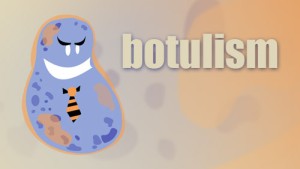
The bacterium Clostridium botulinum is commonly found in soil and untreated water. The bacteria produce spores that best grow in anaerobic (without oxygen) environments, such as in canned food, where toxins are produced. The spores will remain in a dormant state until they are exposed to environments that support their growth.
Types of Botulism
As mentioned above, there are three main types of botulism.
- Wound botulism
- Bacteria comes in direct contact with cut
- Leads to infection that produces the toxin
- Foodborne botulism
- Thrive in environments with little oxygen where they produce toxins
- Contamination is usually found in home-canned vegetables, cure pork and ham, smoked or raw fish, and honey syrup, among others
- Infant botulism
- Infant ingests spores and the bacteria grow in the gastrointestinal tract of the infant
- Most cases are due to eating honey or corn syrup
- Bacteria may appear in stool
- Adult intestinal toxemia (adult intestinal colonization)
- Very rare
- Adult ingests spores and the bacteria grow in the gastrointestinal tract of the adult
- Iatrogenic botulism
- Accidental overdone of botulinum toxin
Symptoms of Botulism
Symptoms of botulism begin to manifest eight to thirty-six hours after coming into contact with the bacteria and its toxins. Oddly, no fever is associated with this type of infection. Symptoms sometimes vary in adults and in infants.
- Adults
- Nausea and vomiting
- Abdominal cramps
- Difficulty swallowing
- Slurred speech
- Dry mouth
- Double vision
- Drooping eyelids
- Difficulty in breathing, why may eventually result to respiratory failure
- Muscle weakness accompanied by paralysis on both sides of the body
- Infants
- Constipation
- Poor feeding and weak sucking
- Drooling
- Respiratory suffering
- Weak cry
- Weakness
Treatment for Botulism
Although the disease cannot be passed from person to person, botulism must be treated immediately to avoid any further complications.
- Induce vomiting to try and vomit out any bacteria.
- If acquired through a wound infection, get proper treatment. Sometimes, it may require surgery.
- Seek medical advice and get the right antitoxin medications.
- In severe cases, a ventilator (breathing machine) may be needed.
Understanding botulism can help when taking first aid training CPR classes as ingestion of toxins, whether from bacteria or plants, are almost always medical emergencies and require treatment as soon as possible.